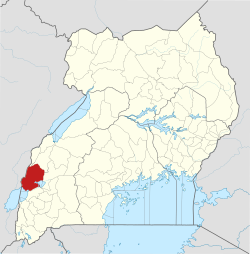Kasese District is a district in Western Uganda.[1] Like most other Ugandan districts, it is named after its chief town and district headquarters, the town of Kasese.
Kasese District | |
|---|---|
 District location in Uganda | |
| Coordinates: 00°11′N 30°05′E / 0.183°N 30.083°E | |
| Country | |
| Region | Western Uganda |
| Sub-region | Rwenzururu sub-region |
| Capital | Kasese |
| Area | |
• Total | 2,724 km2 (1,052 sq mi) |
| • Land | 1,187 km2 (458 sq mi) |
| Population (2012 Estimate) | |
• Total | 747,800 |
| Time zone | UTC+3 (EAT) |
| Website | www |
History
editIn September 2022, the district was hit by deadly landslides.[2]
Location
editKasese District is located along the equator. It is bordered by Kabarole District to the north, Kamwenge District and Kitagwenda District to the east, Rubirizi District to the south, and the Democratic Republic of the Congo to the west. The district headquarters at Kasese are located approximately 359 kilometres (223 mi), by road, west of Kampala, Uganda's capital and largest city.[3]
Geography
editThe district has a total land area of 2,724 square kilometres (1,052 sq mi), of which 885 square kilometres (342 sq mi) is reserved for Queen Elizabeth National Park and 652 square kilometres (252 sq mi) for Rwenzori Mountains National Park, leaving 1,187 square kilometres (458 sq mi) for human habitation and economic utilization. Kasese District is part of the Rwenzururu Kingdom, which is coterminal with the Rwenzururu sub-region, home to an estimated 810,400 inhabitants as f 2022, according to the national census conducted that year.[4] The sub region consists of Bundibugyo District, Ntoroko District, and Kasese District.[4]
Population
editIn 1991, the district population was estimated at 343,600. The 2002 national census put the population of the district at approximately 523,000. It is estimated that in 2014, the population of the district was approximately 694,987.[5]
Ethnicities
editKasese is a multi-ethnic district with many people of different ethnic backgrounds. The main languages and ethnic groups that dominate the area are Bakonzo and Basongora Banyabindi, Batooro and Banyankole Bakiga], the languages of the Bakonzo and the Batooro people respectively. However, there are other ethnic groups in the district who include the Banyankole, the Basongora the Bakiga and the Baganda. There is also common usage of English and Swahili.
Economic activities
editKasese district is mainly agricultural with over 85 percent of the people being peasant farmers who depend on subsistence farming for their livelihood. It has two rainy seasons that come between March and May, and August and November. Temperatures normally range between 23 °C and 30 °C. Crops grown include:
Most of the agricultural produce is either sold locally or transported for sale in Kampala and to other cities and towns in Uganda. Fish farming is slowly taking root in the district and demand for the fish is high both locally and in neighboring countries. Livestock kept in the district includes: Cattle, goats, pigs and poultry. Fishing also occurs on Lake George and on smaller crater lakes in the district. There are two main landing sites on the shores of Lake George, Mahyoro and Kayinja.[6]
The district's main border crossing is Mpondwe, where some 25,000 people cross to and from the Democratic Republic of Congo every day.[7]
See also
editReferences
edit- ^ "Home". KASESE DISTRICT. Retrieved 2024-12-21.
- ^ Heavy rains trigger landslides in Uganda, killing least 15, Reuters, 7 September 2022, archived from the original on 2022-09-07, retrieved 2022-09-07
- ^ "Road Distance Between Kampala And Kasese With Map". Globefeed.com. Retrieved 15 April 2014.
- ^ a b "Home". KASESE DISTRICT. Retrieved 2022-02-13.
- ^ "Estimated Population of Kasese District In 1991, 2002 & 2014". Citypopulation.de. Retrieved 21 May 2014.
- ^ "Kasese District Information and Travel Guide". Uganda Visitor & Travel Guide. Archived from the original on 16 April 2014. Retrieved 15 April 2014.
- ^ "Second patient dies of Ebola in Uganda: Health official". 13 June 2019.